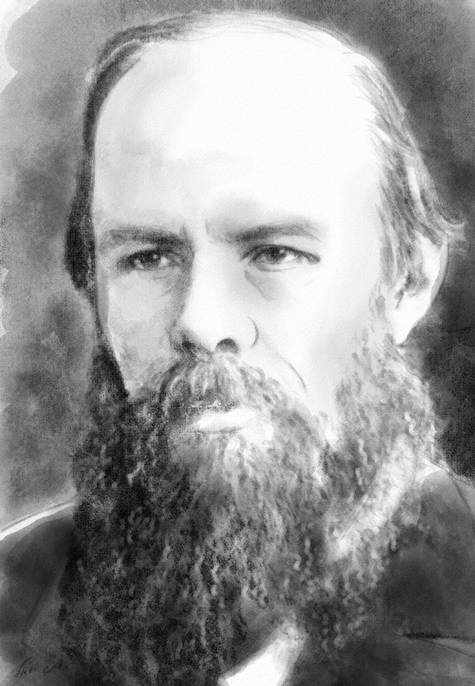
FAQ About Fyodor Dostoevsky

Who was Fyodor Dostoevsky?
Fyodor Dostoevsky was a Russian novelist, short story writer, essayist, and journalist, known for his profound exploration of human psychology within the political, social, and spiritual context of 19th-century Russia. His works include some of the most influential and important novels in global literature, such as Crime and Punishment, The Brothers Karamazov, The Idiot, and Demons.

What are some of Fyodor Dostoevsky's most famous works?
Some of Fyodor Dostoevsky's most famous works include Crime and Punishment, The Brothers Karamazov, The Idiot, and Demons (also known as The Possessed). These novels are renowned for their exploration of human psychology, morality, and existential themes.

What themes are commonly found in Dostoevsky's works?
Fyodor Dostoevsky's works frequently explore themes such as the conflict between free will and determinism, the morality of crime and punishment, the depths of human suffering, faith versus doubt, and the search for God and truth. His novels often delve into the psychological and philosophical struggles of individuals in the face of societal and existential pressures.

How did Dostoevsky's personal experiences influence his writing?
Dostoevsky's personal experiences had a significant impact on his writing. He faced tremendous adversity, including financial hardship, epilepsy, and a near-execution followed by exile to Siberia. These experiences enriched his understanding of suffering and redemption, which are prevalent themes in his literary works. His interaction with different social classes and exposure to radical political ideas also influenced the depth and realism of his characters' psychological and moral conflicts.

What is 'Crime and Punishment' about?
Crime and Punishment is a psychological novel that follows the story of Raskolnikov, an impoverished ex-student in St. Petersburg who plans and executes the murder of a pawnbroker. He believes that by eliminating her, he can achieve great things. However, the novel delves into his ensuing psychological turmoil and moral dilemmas, exploring themes of guilt, redemption, and the nature of justice.

Did Dostoevsky suffer from any mental or physical health issues?
Yes, Dostoevsky suffered from epilepsy, which he experienced as a recurring illness throughout his life. This condition, along with bouts of depression and financial struggles, contributed to the intensity and authenticity of the psychological depth found in his characters and narratives.

Why is Dostoevsky considered a great writer?
Dostoevsky is considered a great writer for his ability to delve deeply into the psychological and existential aspects of human nature. His novels expertly combine a compelling narrative with philosophical and moral questions, effectively exploring the complexities of the human condition. His characters often embody intense inner conflicts that resonate universally, making his work enduringly relevant and powerful.

How did Fyodor Dostoevsky's early life and education shape his writing?
Fyodor Dostoevsky was born into a relatively comfortable middle-class family and received a good education, studying engineering at the Military Engineering-Technical University in Saint Petersburg. However, his passion for literature led him to abandon this career path. The social injustices and inequality he observed in his youth, compounded by the liberal and often radical ideas circulating in Russian intelligentsia, played a significant role in shaping the themes of justice and morality in his work.

What impact did Dostoevsky have on literature and philosophy?
Dostoevsky had a profound impact on literature and philosophy, influencing existentialist and psychoanalytic theories. His exploration of existential themes laid the groundwork for existential philosophy, and his insight into human psychology anticipated developments in psychoanalytic theory. Literary figures like Nietzsche, Freud, Kafka, and Camus, among others, have acknowledged their debt to Dostoevsky’s influence.

What was Dostoevsky's relationship with the Russian Orthodox Church?
Dostoevsky had a complex relationship with the Russian Orthodox Church. He was deeply religious and his faith played a crucial role in his life and works. His novels often explore the struggle between faith and atheism, and he depicted Christianity as a path towards redemption and truth. However, his religious views were personal and at times conflicted with the official position of the Church.

How did Dostoevsky's time in a Siberian prison camp affect him?
Dostoevsky's time in a Siberian prison camp was transformative. Initially sentenced to death for his involvement in a radical political circle, he was pardoned by the Tsar and sent to Siberia instead. This experience exposed him to the harsh realities of life and human suffering on a profound level. The insights gained during this period deeply influenced his later works, infusing them with empathy and philosophical depth beyond mere social critique.

What literary techniques did Dostoevsky employ in his novels?
Dostoevsky is known for his use of psychological realism, deep character analysis, and philosophical dialogue. He often employed a third-person omniscient narrator, allowing access to the inner thoughts and emotions of his characters, while using a multi-perspective narrative to provide different viewpoints. His style includes intense dialogues that reflect the internal conflicts of the characters.

Was Dostoevsky influenced by other writers or philosophers?
Dostoevsky was influenced by a range of writers and philosophers. He admired Russian writers such as Gogol and Pushkin, as well as European authors like Dickens. Philosophically, figures like Rousseau, Kant, and Hegel contributed to his introspective and critical examination of society and morality. His works often engage with and critique contemporary philosophical ideas.

What role do women play in Dostoevsky's novels?
Women in Dostoevsky's novels often embody complex and crucial roles. While some characters reflect societal stereotypes of 19th-century Russia, they also exhibit profound strength, morality, and influence on the male protagonists' development. Characters like Sonya in Crime and Punishment represent themes of sacrifice and redemption, while others, such as Katerina in The Brothers Karamazov, display intense emotion and moral conviction.

What is the significance of 'The Brothers Karamazov'?
The Brothers Karamazov is considered one of Dostoevsky's greatest masterpieces. The novel explores profound themes such as faith, doubt, free will, and morality through the tumultuous relationships among the Karamazov brothers. Its philosophical dialogue, particularly the chapter 'The Grand Inquisitor,' addresses significant existential and theological questions, making it a pivotal work in world literature.

How does Dostoevsky's work reflect the social issues of his time?
Dostoevsky's work reflects the social issues of 19th-century Russia, including poverty, class division, and the rapid societal changes taking place. His novels critically examine the impact of radical political ideologies and the struggle of individuals striving for identity and morality in an increasingly secular society. His nuanced portrayals encourage readers to reflect on the complex realities faced by Russia during his lifetime.

In what ways did Dostoevsky's political views manifest in his writings?
Dostoevsky's political views were complex and evolved over time. Initially involved with socialist intellectual circles, his experience in Siberian exile led to a shift towards nationalism and conservative views, particularly in the context of Russian Orthodoxy. His later novels often critique both radical ideas and the disruptive impact of Western European influence, emphasizing faith and moral responsibility over political utopianism.

Where and when was Fyodor Dostoevsky born?
Fyodor Dostoevsky was born on November 11, 1821, in Moscow, Russia. He was the second of seven children in the family.

What is the narrative style typical of Dostoevsky's works?
Dostoevsky's narrative style is characterized by psychological depth and complexity, often employing a third-person omniscient viewpoint that dives into the minds of his characters. He is known for his intense and dynamic dialogues, which explore philosophical and moral dilemmas. This approach allows readers to engage deeply with the characters' internal struggles and the existential themes present in his works.

Did Dostoevsky have any famous literary contemporaries?
Yes, Dostoevsky had several famous literary contemporaries, including Leo Tolstoy and Ivan Turgenev. While their styles and perspectives sometimes differed, all three are considered giants of Russian literature and contributed significantly to the cultural and intellectual landscape of 19th-century Russia.
